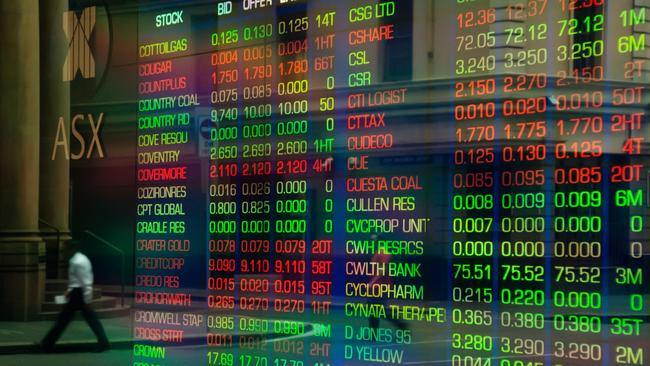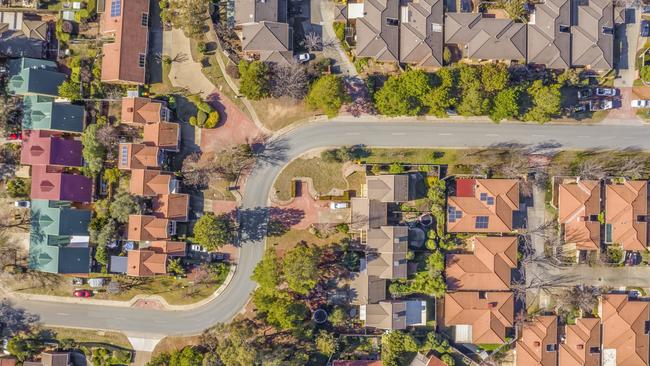Property vs shares: Which offers the best investment return?
Should you buy property or sink your money into shares? There’s an obvious choice that could bag you an extra $1.4 million.
Investing
Don't miss out on the headlines from Investing. Followed categories will be added to My News.
One of the most common questions I get asked as a financial adviser is whether it’s better to invest into shares or buy property.
And particularly in the current state of flux we’re seeing across financial markets around the world, the question is even more relevant today.
When you put property and shares head to head, you might be surprised to learn that the returns are basically the same.
Looking at Westpac data going back 150 years, the long-term growth return of Australian property is 6.3 per cent. Then you need to add on the rental income you receive on a property, which averages out to 2 per cent after covering ongoing property costs like strata, insurance and maintenance.
This brings the total long-term return (growth + income) to 8.3 per cent, which compares to the long-term return on Australian shares of 9.8 per cent.
This shows the actual difference in return comes in at 1.5 per cent in favour of shares. But here’s the thing, when you buy property you don’t save up $500,000 and then go and buy a $500,000 property. Instead, you save up a smaller amount of money as a deposit, then go and borrow the rest of the money from the bank so you can buy your property.

A typical property deposit is 20 per cent, meaning that you put 20 per cent down in savings and borrow the rest. This means you add your 20 per cent with the bank’s 80 per cent, and all of a sudden you’re able to invest into a property that’s worth five times as much as the amount of savings you’re investing.
This is called ‘leverage’. And it’s leverage that makes all the difference when you buy property.
Let me illustrate with some numbers:
In this example, I’ve only included the growth return on property and excluded rental income, taxes, and borrowing costs to keep things simple. These are not insignificant, but you can see from the big gap between property and shares that there’s plenty of room to include these and still have property come out way in front.
It’s also worth calling out that these figures assume consistent returns every year, which we know based on the ups and downs of the markets won’t happen in reality. This will reflect what should happen over the long-term, but you should be prepared for the variations that will come from year to year.
You can see from these figures that the long-term return on shares is strong, and that keeping money invested for a long time will create some serious results. But when you look at the total return on property, even though the return percentage is lower, property is a clear winner. This is driven by the fact you’re starting with a much bigger initial investment that then grows and compounds over time.
How to set up your property purchase for success
Property is a winning strategy, but it does come with risks that are important to manage.
The risk with property comes from two main areas. Firstly, you need to choose a good property that will grow. And the second critical piece of the puzzle is making sure you can (comfortably) hold onto the property for the length of time you need to get the results you want.
When it comes to choosing a good property, there are a lot of different opinions out there. Calling out also that there are many different ways to be right. But in my view, buying a quality property in a good suburb where supply is limited and demand is strong goes a long way.

Sure there are other ways you can buy property – chasing the next property hotspot, finding that underloved suburb that’s sure to become more popular over time, or buying a place in that regional hub that’s going places. They can work, but they come with a much higher risk.
When it comes to setting up your property purchase in a way that will allow you to hold the property for as long as you need to get the results you want, it’s actually pretty simple. Not necessarily easy, but simple. It all comes down to how you plan your purchase.
Any time you buy property, you should start by mapping out where your money is ‘at’ today, and how it will change moving forward. Then you can look at how this will change when you include a property.
When you do this you can see what your property purchase means for how much leftover cashflow or savings you’ll have post your purchase. You can also look at how this will change over time as your lifestyle changes, particularly if you have (or are planning to have) kids with changing costs like childcare and schooling.
This process also allows you to stress test how your property would fit if interest rates were to increase further, something highly relevant with where the economy is today.
When you purchase property well, it’s an investment that’s likely to add hundreds of thousands of dollars to your wealth bottom line over time, and the planning can get complex – if you’re struggling to do this alone, don’t be afraid to invest in some quality professional help to get this right – it will pay for itself many times over.
The wrap
Share investing is powerful and can put you on a solid trajectory to building some serious wealth. You don’t need property, and if you’re really fearful or really don’t like or want property, you can still get ahead without it.
But property will help you to get to where you want to be faster. Almost all of the risks that come with buying property can be well managed with the right approach and careful planning. So the question then becomes, if property will get you there faster and easier – why wouldn’t you?
Ben Nash is a finance expert commentator, podcaster, financial adviser and founder of Pivot Wealth, the host of the How to be Successful with Money podcast, and author of the Amazon best-selling book ‘Get Unstuck’
Ben has just launched a series of free online money education events to help you get on the front financial foot. You can check out all the details and book your place here.
Disclaimer: The information contained in this article is general in nature and does not take into account your personal objectives, financial situation or needs. Therefore, you should consider whether the information is appropriate to your circumstances before acting on it, and where appropriate, seek professional advice from a finance professional.
Originally published as Property vs shares: Which offers the best investment return?





